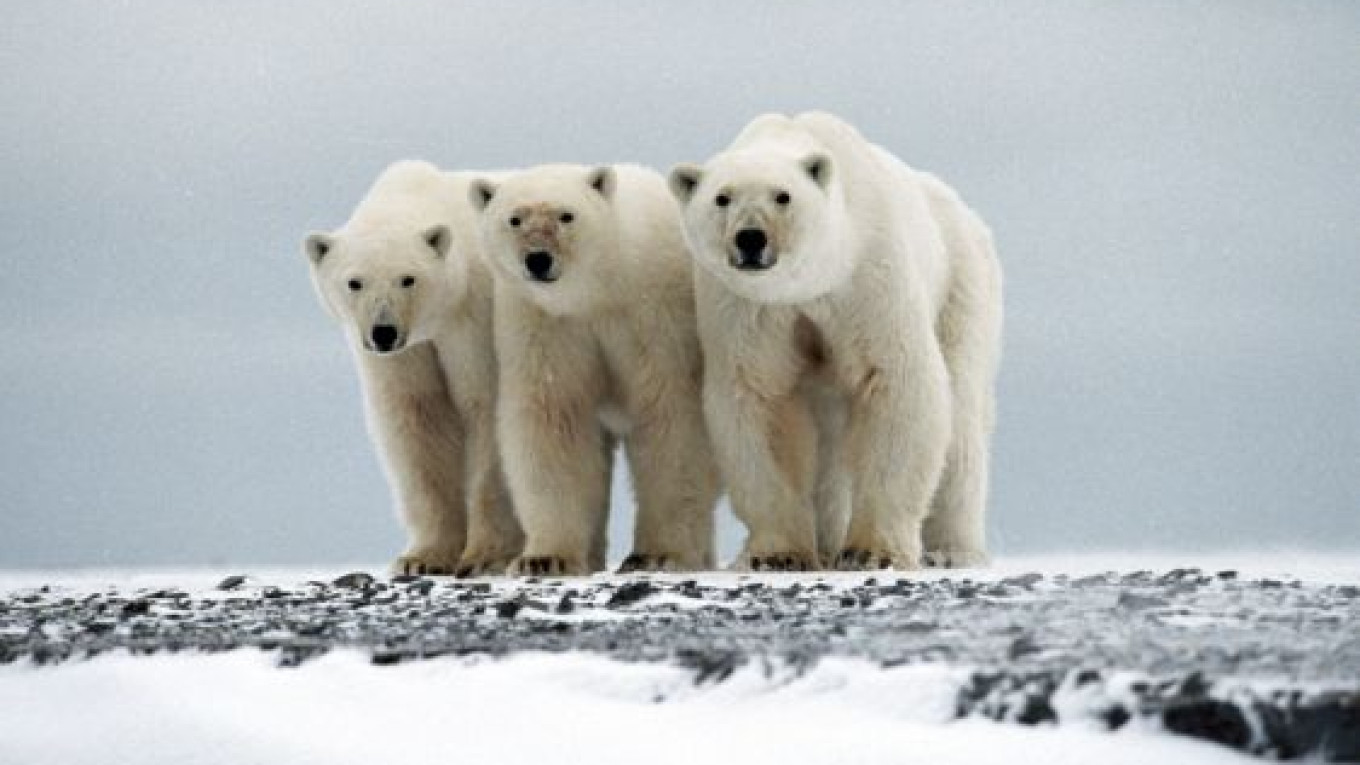Polar bears in Russia are adapting their behavior to overcome the "catastrophic effects" of global warming, but new migration routes are pushing them dangerously close to humans, a leading researcher said.
The polar bear population that stretches from eastern Russia to the U.S. state of Alaska has fallen from an estimated 4,000 to about 1,500 as ice fields have melted in the past 20 years, said Nikita Ovsyanikov, the top polar bear expert at the Academy of Sciences.
But growing temperatures have also opened up some new feeding grounds by allowing the bears to break through the ice, he said, forcing the great white carnivores closer to human settlements where they are often killed by nervous residents and poachers.
"What we are seeing is likely a model of how they have survived such periods of warming in the past, the sea is changing, their food sources are changing, but alternative resources are appearing," said Ovsyanikov.
Environmentalist groups say that the up to 4 degree Celsius rise felt across parts of the Arctic in the last 30 years is a direct result of human activity and carbon emissions.
"Of course some populations may die out completely, and some will shrink drastically, but some will survive," Osyanikov told Reuters Television in an interview.
Polar bears' survival depends on catching seals on ice, but Arctic sea ice is shrinking fast: In 2007, it shrank to its smallest since satellite measurements began 30 years ago, raising the prospect that it could vanish in summers.
Video footage shot by Ovsyanikov showed a bear crashing through ice and slowly pulling himself back up with his front paws before crashing through again. Another shows a bear being attacked by two dogs as he searches for food near a human settlement.
Ovsyanikov has studied the bears over the past 19 years on Vrangeliya Island, a sanctuary off Russia's northeastern coast near the gold-rich, underpopulated region of Chukotka.
In recent years bears have begun to arrive on the island exhausted from swimming, and the number of their dens has collapsed, he said.
Bears who live on the ice around the island in winter are forced to migrate in the summer. They either go north towards the pole, where the food supply is irregular and breeding is difficult, or to the Russian mainland where they come into conflict with humans.
"All of the optimal feeding grounds for the polar bears ... for several months of the year practically turn into open water where the bears cannot live," Ovsyanikov said.
"They end up on shore at human settlements, and more and more often they are killed."
While individual bears and populations are in danger, Ovsyanikov said the species was adaptable and would survive.
"Polar bears as a species have survived at least four bouts of global warming that have taken place since the ice age," he said. "Biologically, polar bears can survive such periods."
A Message from The Moscow Times:
Dear readers,
We are facing unprecedented challenges. Russia's Prosecutor General's Office has designated The Moscow Times as an "undesirable" organization, criminalizing our work and putting our staff at risk of prosecution. This follows our earlier unjust labeling as a "foreign agent."
These actions are direct attempts to silence independent journalism in Russia. The authorities claim our work "discredits the decisions of the Russian leadership." We see things differently: we strive to provide accurate, unbiased reporting on Russia.
We, the journalists of The Moscow Times, refuse to be silenced. But to continue our work, we need your help.
Your support, no matter how small, makes a world of difference. If you can, please support us monthly starting from just $2. It's quick to set up, and every contribution makes a significant impact.
By supporting The Moscow Times, you're defending open, independent journalism in the face of repression. Thank you for standing with us.
Remind me later.


